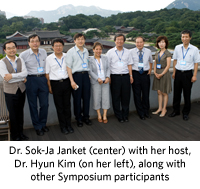GSDM Faculty Discusses Methodological Issues in Research at International Symposium
Research Associate Professor Dr. Sok-Ja Janket was invited as a special lecturer to the Seoul National University Symposium in early September. The Symposium was a forum to determine the curriculum of epidemiologic education in dental/public health graduate schools.
Her lecture was the keynote speech and was titled, “Methodological Issues in Oral and Systemic Health Research.” Her lecture focused on improving the quality of oral health investigations and how she has accomplished that in her study of pro-inflammatory molecules present in oral health research that are also expressed in other systemic biochemical reactions.
Dr. Janket explained her research saying, “For example, cytokines such as Interleukin-1, interleukin-6, or TNF-alpha observed in periodontitis are also expressed in systemic health, specifically in carbohydrate or lipid metabolism. This creates a triangular relationship which is called confounding in epidemiology. This phenomenon is described in my review, Oral Infection, Hyperglycemia and Endothelial Dysfunction.”
Dr. Janket’s review was published in a 2008 edition of Oral Surgery, Oral Medicine, Oral Pathology, Oral Radiology, & Endodontics. She collaborated on this review with Drs. Thomas Van Dyke, Judith Jones, Jukka Meurman, and Alison Baird.
Dr. Janket also emphasizes the need to study confounding to conduct unbiased research. She said, “Meticulous adjustment of all confounding factors is required to achieve unbiased results. And, this is also true in bench science, because some molecules are expressed in different part of the body by different cells with different functions.”
At the close of the Symposium, Dr. Janket reported that a consensus related to her keynote speech topic was reached. She said, “The consensus was that the probing-depth based assessment of periodontitis could be subjective, time-consuming, and might bring discomfort to the study participants. Thus, in order to improve the quality of our oral health investigations, we must first, use a precise, objective, and non-invasive marker for pan-oral infection and second, adjust for all confounding factors carefully. On a personal note, it was also gratifying to know that researchers present at the Symposium plan to use salivary lysozyme, which I have been using in my research, to measure pan-oral infection in their future randomized trials.”
